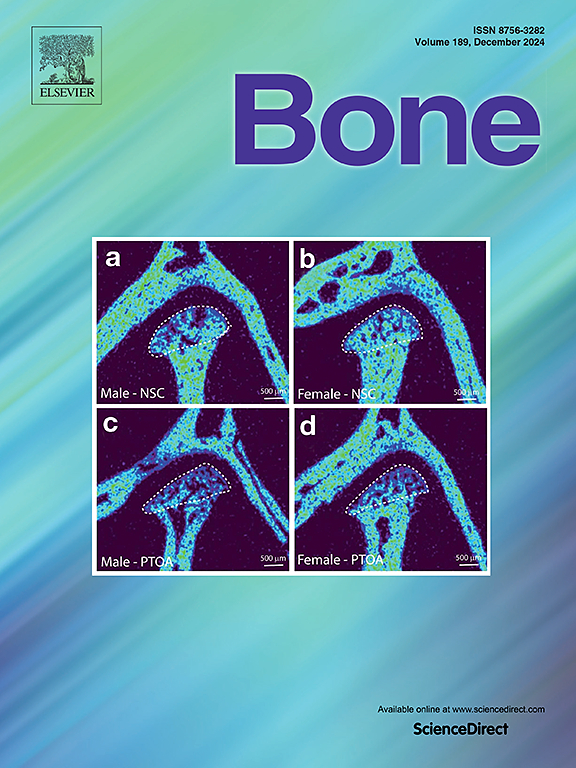Downregulation of Krüppel-like factor 15 expression delays endochondral bone ossification during fracture healing
IF 3.5
2区 医学
Q2 ENDOCRINOLOGY & METABOLISM
引用次数: 0
Abstract
Objective
The role of Krüppel-like zinc finger transcription factor 15 (KLF15) in endochondral ossification during fracture healing remains unexplored. In this study, we aimed to elucidate the impact of KLF15 in a mouse model of tibial transverse fracture.
Methods
We created tamoxifen-inducible, cartilage-specific KLF15 knockout mice (KLF15 KO). KLF15 fl/fl Col2-CreERT mice from the same litters as the KLF15 KO mice, but not treated with 4-hydroxytamoxifen, were used as controls (CT). At 10 weeks, male KLF15 KO and CT mice underwent tibial fracture followed by intramedullary nailing. Both groups were administered tamoxifen at days 0, 3, and 7 after surgery. The tibiae were harvested on post-surgery days 7, 10, and 14 for radiological assessment using micro-computed tomography. Histological staining (Safranin-O) and immunohistochemistry for KLF15, SOX9, Indian hedgehog (IHH), RUNX2, and Osterix were performed. Additionally, cartilage from mouse fetus was cultured for qRT-PCR and western blot analyses of KLF15, SOX9, IHH, Col2, RUNX2, Osterix, TGF-β, SMAD3, and phosphor-SMAD3.
Results
The radiological assessment revealed that immature callus formation was delayed in KLF15 KO, compared with that in CT, peaking on day 14 compared with that on day 10 in CT. KLF15 KO mice exhibited delayed fracture healing and reduced Safranin-O staining at days 7 and 10 post-surgery. The ratio of cells positive for KLF15 and SOX9 was significantly lower in KLF15 KO than in CT, whereas the ratios for IHH, RUNX2, and Osterix showed no significant difference. RT-PCR revealed reduced expression of KLF15, SOX9, and COL2, with no significant changes in IHH, Osterix, RUNX2, TGF-β, and SMAD3. Western blot analysis indicated decreased SMAD3 phosphorylation in KLF15 KO mice.
Conclusion
KLF15 regulates SOX9 via the TGF-β-SMAD3-SOX9 pathway, independent of IHH, in endochondral ossification. The KLF15 deficiency decreases SOX9 expression through reduced SMAD3 phosphorylation, subsequently delaying fracture healing.
下调Krüppel样因子15的表达可延缓骨折愈合过程中的软骨内骨化。
目的:Krüppel样锌指转录因子15(KLF15)在骨折愈合过程中软骨内骨化过程中的作用仍有待探索。本研究旨在阐明 KLF15 在胫骨横向骨折小鼠模型中的影响:我们创建了他莫昔芬诱导的软骨特异性 KLF15 基因敲除小鼠(KLF15 KO)。KLF15 fl/fl Col2-CreERT小鼠与KLF15 KO小鼠来自同一窝,但未接受4-羟基他莫昔芬治疗,作为对照组(CT)。10 周时,雄性 KLF15 KO 小鼠和 CT 小鼠接受胫骨骨折髓内钉治疗。两组小鼠均在术后第 0、3 和 7 天服用他莫昔芬。手术后第 7、10 和 14 天采集胫骨,使用微型计算机断层扫描进行放射学评估。对KLF15、SOX9、印度刺猬(IHH)、RUNX2和Osterix进行组织染色(Safranin-O)和免疫组化。此外,还培养了小鼠胎儿软骨,对KLF15、SOX9、IHH、Col2、RUNX2、Osterix、TGF-β、SMAD3和phosphor-SMAD3进行了qRT-PCR和Western印迹分析:放射学评估结果显示,与CT小鼠相比,KLF15 KO小鼠的未成熟胼胝体形成延迟,在第14天达到峰值,而CT小鼠在第10天达到峰值。KLF15 KO小鼠骨折愈合延迟,术后第7天和第10天的Safranin-O染色减少。KLF15 KO小鼠的KLF15和SOX9阳性细胞比率明显低于CT小鼠,而IHH、RUNX2和Osterix的比率则无明显差异。RT-PCR显示KLF15、SOX9和COL2的表达量减少,而IHH、Osterix、RUNX2、TGF-β和SMAD3没有明显变化。Western 印迹分析表明,KLF15 KO 小鼠的 SMAD3 磷酸化减少:结论:在软骨内骨化过程中,KLF15通过TGF-β-SMAD3-SOX9通路调节SOX9,与IHH无关。KLF15缺乏会通过减少SMAD3磷酸化降低SOX9的表达,从而延迟骨折愈合。
本文章由计算机程序翻译,如有差异,请以英文原文为准。
求助全文
约1分钟内获得全文
求助全文
来源期刊

Bone
医学-内分泌学与代谢
CiteScore
8.90
自引率
4.90%
发文量
264
审稿时长
30 days
期刊介绍:
BONE is an interdisciplinary forum for the rapid publication of original articles and reviews on basic, translational, and clinical aspects of bone and mineral metabolism. The Journal also encourages submissions related to interactions of bone with other organ systems, including cartilage, endocrine, muscle, fat, neural, vascular, gastrointestinal, hematopoietic, and immune systems. Particular attention is placed on the application of experimental studies to clinical practice.
 求助内容:
求助内容: 应助结果提醒方式:
应助结果提醒方式:


